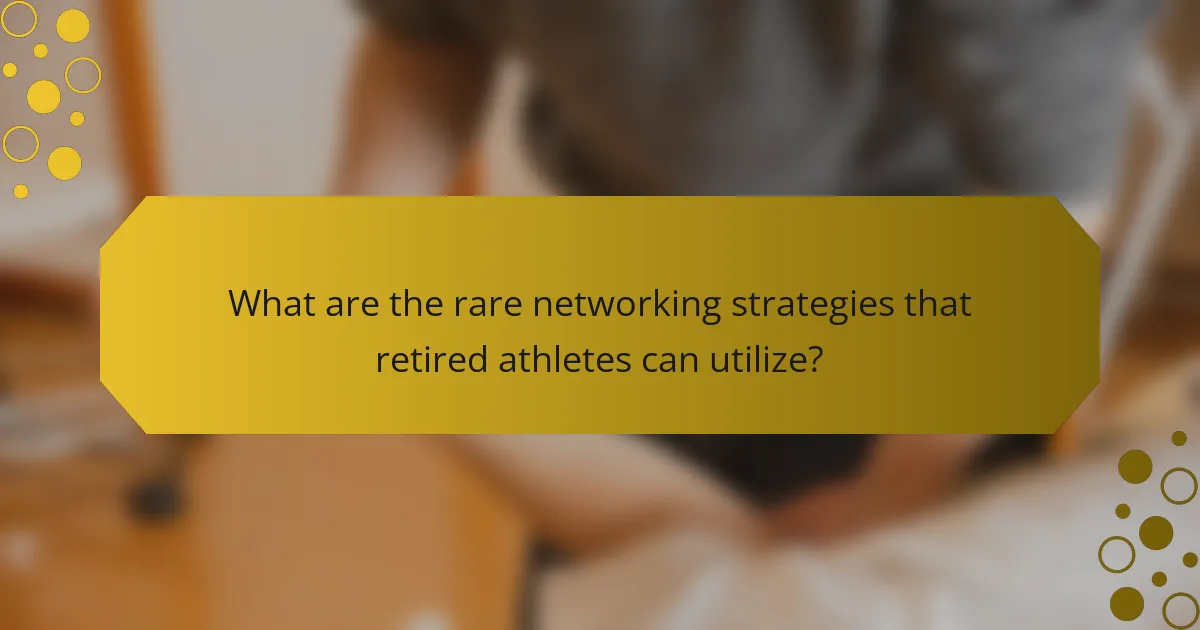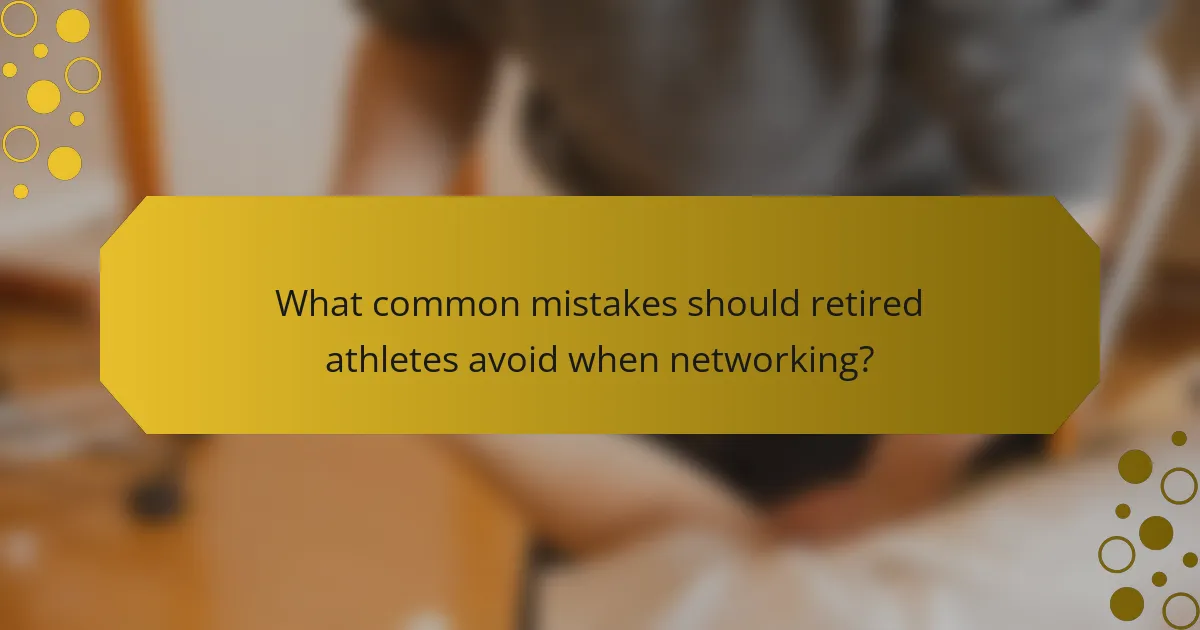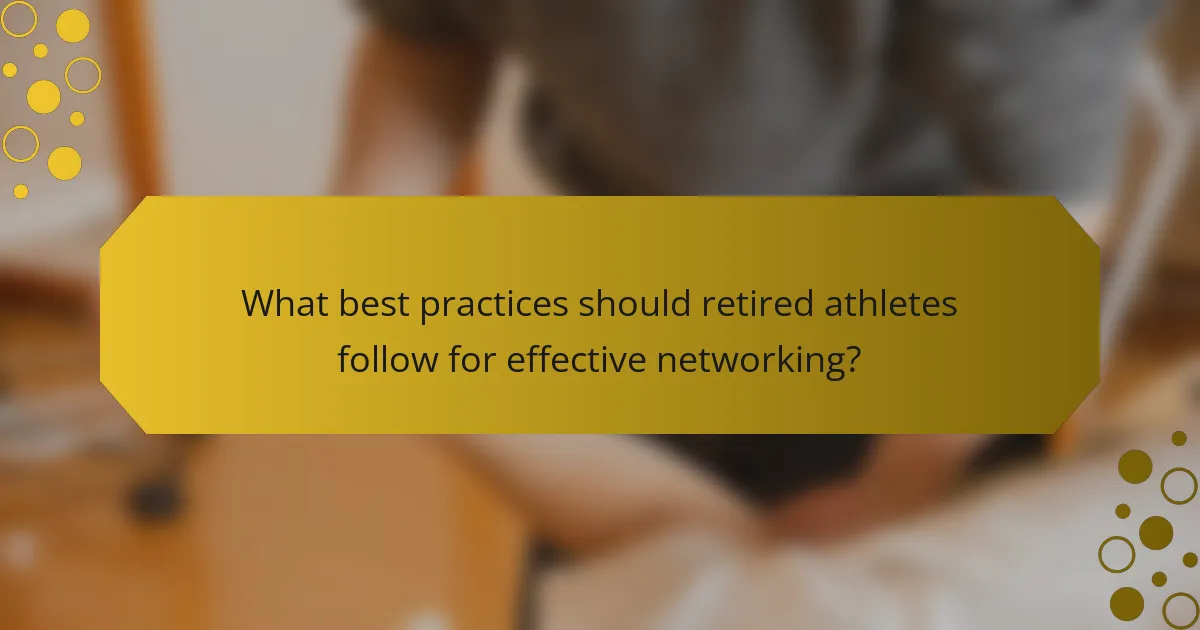Retired athletes face unique challenges in transitioning to new careers, but networking can open doors to valuable opportunities. This article explores key networking events specific to athletes, the role of alumni associations, and the benefits of mentorship programs. It also highlights the importance of social media platforms like LinkedIn for showcasing skills and connecting with industry professionals. By actively engaging in these strategies, retired athletes can build meaningful connections and enhance their post-career success.

What are the key networking opportunities for retired athletes?
Retired athletes have various key networking opportunities that can enhance their post-career life. Engaging in industry events, joining alumni associations, and participating in mentorship programs are effective ways to build connections.
Networking events specifically designed for athletes, such as sports conferences and charity events, provide platforms to meet industry leaders. Alumni associations offer a unique attribute, as they connect retired athletes with former teammates and coaches, fostering a sense of community.
Additionally, social media platforms like LinkedIn allow retired athletes to showcase their skills and connect with professionals in different fields. These digital spaces can lead to rare opportunities in coaching, sports management, or broadcasting.
By actively participating in these networking opportunities, retired athletes can leverage their unique experiences to transition into new careers successfully.
How can retired athletes leverage their sports connections?
Retired athletes can leverage their sports connections by engaging in networking opportunities that facilitate career transitions. They can attend industry events, join alumni associations, and participate in workshops to connect with former teammates and professionals in related fields. These connections can lead to mentorship, job referrals, and collaborative projects, enhancing their post-sport careers. Networking also allows retired athletes to share their unique experiences, which can differentiate them in competitive job markets.
What role do alumni associations play in networking?
Alumni associations play a crucial role in networking for retired athletes by facilitating connections and providing resources. They organize events that foster relationships among former athletes, coaches, and sports professionals. These gatherings often feature guest speakers, workshops, and social activities, enhancing networking opportunities. Additionally, alumni associations can offer mentorship programs, connecting retired athletes with younger generations for guidance and support. This unique attribute of fostering intergenerational connections distinguishes alumni associations from other networking platforms.
How can social media enhance networking for retired athletes?
Social media enhances networking for retired athletes by providing platforms to connect, share experiences, and access opportunities. These platforms facilitate engagement with former teammates, coaches, and fans, fostering a supportive community. Retired athletes can join specific groups, attend virtual events, and utilize networking tools to expand their professional connections. Additionally, social media allows for personal branding, showcasing skills and achievements, which can lead to mentorship and career opportunities in sports-related fields.
Which platforms are most effective for athlete networking?
LinkedIn, Facebook Groups, and Twitter are effective platforms for athlete networking. LinkedIn offers professional connections, while Facebook Groups foster community engagement. Twitter allows real-time interaction with fans and industry peers. These platforms provide unique opportunities to build relationships and share experiences.

What unique events cater specifically to retired athletes?
Retired athletes can engage in unique events designed for their networking needs, such as alumni sports gatherings, industry conferences, and mentorship programs. These events foster connections among former athletes, allowing them to share experiences and explore career opportunities. Specialized workshops and seminars also cater to retired athletes, focusing on skill development and personal branding. Additionally, charity events often feature retired athletes, promoting community engagement while offering networking opportunities.
What types of networking events should retired athletes attend?
Retired athletes should attend networking events focused on sports industry connections, career transition workshops, and alumni gatherings. These events provide opportunities to connect with peers, industry professionals, and potential employers.
Sports industry conferences offer insights into trends and innovations, while career transition workshops help athletes navigate new career paths. Alumni gatherings foster relationships with former teammates and coaches, enhancing professional networks.
Additionally, charity events and fundraisers allow retired athletes to leverage their influence for a cause while building connections. Engaging in these networking events can lead to mentorship opportunities and collaborations in various fields.
How do industry conferences benefit retired athletes?
Industry conferences provide retired athletes with valuable networking opportunities, enhancing their professional connections. These events allow former athletes to meet industry leaders, potential sponsors, and peers, fostering collaborations. Networking can lead to mentorship, job offers, and partnership opportunities, aligning with their career transitions. Additionally, conferences often feature workshops that equip retired athletes with skills relevant to their new ventures. Engaging in these settings helps them stay connected to their sports community while exploring diverse career paths.
What are the advantages of attending sports charity events?
Attending sports charity events offers retired athletes valuable networking opportunities. These events connect athletes with sponsors, organizations, and fellow athletes, fostering relationships that can lead to collaborations or endorsements. Building connections in a supportive environment enhances professional visibility and opens doors for future endeavors. Engaging in charity work also reinforces personal brand identity while contributing to meaningful causes.

What are the rare networking strategies that retired athletes can utilize?
Retired athletes can utilize unique networking strategies such as leveraging their sports legacy, engaging in mentorship programs, and participating in exclusive alumni events. These approaches foster valuable connections and opportunities tailored to their experiences.
Engaging with sports organizations can create platforms for collaboration and visibility. Building a personal brand through social media enhances outreach and connection potential. Additionally, attending industry conferences allows retired athletes to network with professionals in various fields, expanding their influence beyond sports.
Mentorship programs offer a rare opportunity for retired athletes to guide younger athletes while simultaneously building their own networks. This reciprocal relationship often leads to unique partnerships and collaborations.
Alumni events provide a unique attribute, allowing retired athletes to reconnect with former teammates and coaches, tapping into shared experiences for networking. By embracing these strategies, retired athletes can effectively navigate new professional landscapes.
How can retired athletes create their own networking events?
Retired athletes can create their own networking events by leveraging their unique experiences and connections. They should identify a target audience, select a suitable venue, and promote the event through social media and existing networks. Collaborating with sports organizations can enhance visibility and credibility. Additionally, incorporating engaging activities like panel discussions or workshops can foster meaningful connections among attendees.
What unconventional partnerships can retired athletes explore?
Retired athletes can explore unconventional partnerships in various fields, such as business, education, and wellness. Collaborating with startups allows athletes to leverage their personal brand for innovative products. Engaging with educational institutions can facilitate mentorship programs, fostering connections with young athletes. Partnering with wellness organizations promotes health initiatives, enhancing community well-being. Additionally, joining forces with non-profits can amplify social causes, creating a positive impact. These partnerships can lead to unique opportunities and expanded networks.

How can retired athletes build meaningful connections in their new careers?
Retired athletes can build meaningful connections in new careers through strategic networking. Engaging in industry-specific events, joining professional organizations, and utilizing social media platforms can enhance their visibility and facilitate connections. Networking events provide opportunities to meet potential employers, mentors, and peers who share similar experiences. Additionally, volunteering in community initiatives can expand their network while contributing positively to society.
What skills from athletics are transferable to networking in business?
Athletes possess several transferable skills that enhance networking in business. Key skills include teamwork, communication, resilience, and goal-setting. Teamwork fosters collaboration, essential for building professional relationships. Effective communication aids in conveying ideas clearly. Resilience helps navigate challenges in networking. Goal-setting drives strategic relationship development, ensuring athletes leverage their competitive edge in business contexts.
How can mentorship enhance networking for retired athletes?
Mentorship can significantly enhance networking for retired athletes by providing guidance and access to valuable connections. Experienced mentors can introduce retired athletes to industry professionals, helping them navigate new career paths. This relationship fosters trust and opens doors to events, workshops, and networking opportunities tailored for former athletes. Engaging with mentors also encourages the sharing of unique insights, enriching the networking experience. As a result, retired athletes can build a robust professional network that supports their post-sports career aspirations.

What common mistakes should retired athletes avoid when networking?
Retired athletes should avoid several common mistakes when networking. Failing to leverage existing connections can limit opportunities. Ignoring the importance of follow-up can lead to missed relationships. Being overly self-promotional may deter potential contacts. Neglecting to diversify networking channels restricts reach. Finally, not being authentic can undermine credibility.
How can retired athletes ensure they maintain professional relationships?
Retired athletes can maintain professional relationships by actively engaging in networking opportunities. Attending industry events, joining alumni associations, and participating in mentorship programs foster connections. Utilizing social media platforms like LinkedIn enhances visibility and facilitates interactions with former colleagues and industry professionals. Establishing a personal brand through public speaking and community involvement further solidifies these relationships. Consistent communication and follow-ups are essential for nurturing connections over time.

What best practices should retired athletes follow for effective networking?
Retired athletes should actively engage in networking to leverage their unique experiences. They can attend industry events, join professional organizations, and utilize social media platforms to connect with peers and mentors. Building relationships through mentorship and volunteering can also open doors to new opportunities. Networking allows retired athletes to transition into new careers, share their insights, and contribute to their communities.
How can retired athletes follow up after networking events?
Retired athletes can follow up after networking events by sending personalized messages to new contacts. Express appreciation for their time and insights, and mention specific topics discussed to strengthen the connection. Additionally, consider scheduling a follow-up meeting or coffee chat to explore potential collaborations. Engaging on social media platforms can also maintain the relationship.
What strategies can help retired athletes expand their network sustainably?
Retired athletes can expand their network sustainably by engaging in community events, leveraging social media, and participating in mentorship programs. Attending industry conferences and workshops also provides valuable opportunities for connection.
Building relationships with former teammates and coaches fosters a supportive network. Volunteering for sports organizations or charities can create meaningful connections while giving back to the community.
Finally, maintaining consistent communication through regular follow-ups enhances these relationships over time. This approach emphasizes the unique attribute of retired athletes’ shared experiences, making their networking efforts more impactful.
